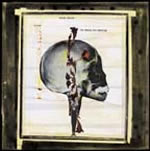|
|
 |
Dusted Reviews
Artist: The Circus Devils Album: The Harold Pig Memorial Label: Recordhead Review date: Jan. 21, 2003 |

|
|
|
 |
Adolescent Commitment and The Joy of Noise
Whatever one might have to say about Robert Pollard's plethora of side-projects, they are consistently contained within lovely, meticulous packaging. There is an oft-repeated anecdote that a teenage Pollard begin writing songs for fictitious album covers he designed himself, and this teenage sensibility remains in both his musical output and the covers he makes for his records. Harold Pig is no exception, as it features a lovely mix of collage, typed titles, and an x-ray of a skull. It's easy to suggest that Pollard is spreading himself too thin these days, because, well…it’s true.
Pollard has always been prolific, but his self-released Fading Captain series has taken his musical diarrhea to stunning new extremes, with what seems like a new record every few weeks featuring Pollard and some collaborator screaming over badly-recorded "experimental" backing tracks. This loose-cannon, unpredictable nature of Pollard's work was a big part of its appeal when Guided By Voices first came to wide attention, but it's quickly grown into his Achilles heel, often preventing him from assembling solid, even remotely coherent albums. Thus, his Fading Captain releases often produce skepticism in the GBV fan, along with a doomed hope that at least one or two songs will prove to be the proverbial diamonds in the rough that will recapture the band's former glory.
On the Circus Devils' Harold Pig Memorial, Pollard writes lyrics and melodies for tracks composed by GBV's bass player, Tim Tobias, and his brother, Todd. It's a concept album, naturally, which follows the exploits of a Las Vegas biker (apparently) who eventually comes to a sticky end after some depraved experiences on the road. Perhaps more surprisingly, it's actually good, an extended mood piece about desolation and bitterness formed mostly with acoustic guitars, occasional hissing distortion, and Pollard's still-impressive rasp of a voice. As he proved on last year's Calling Zero, a collaboration with Superchunk's Mac McCaughan, Pollard often stretches and does his best work when he's confronted with a conflicting sensibility, and this proves to be the case on much of Harold Pig. That's not to say that there isn't some aimless filler on this record, or that it achieves the highs of GBV's best work, but it does show glimmers of Pollard's offhand brilliance, even some genuine pop gems.
Pollard's been sounding rather world-weary lately, and this approach works perfectly for the bleak, sun-baked tone of these songs, which are as cryptic as ever in their lyrical content. The difference is in the more relaxed, languid tone of the music crafted by the Tobias brothers, who reveal an equal love for early Pink Floyd, the Kinks, and all kinds of country music. There are some bombastic rockers ("Saved Herself, Shaved Herself"), shimmering jangle-pop ("Last Punk Standing"), and whiskey-soaked acoustic ballads ("Injured?"). In its own way, it's a rather ambitious album, attempting to function both as an eccentric oddity and a full-blooded rock record. It doesn't always succeed, as might be expected, but in its seedy, slightly disturbing, vaguely romantic atmosphere, it manages to capture a world in a way that few records attempt these days. And given the predilection for perfectionist fussiness in much of the music created recently, it's refreshing to hear music made by people who clearly relish improvisation and the messy beauty of a first take.
It's easy to criticize Pollard for his relentless releases and his refusal to sit still and craft an album, but there is a loving approach towards music that comes through, even when the particular song isn't actually successful. It's the same sensibility that led him to make music for those fake album covers so many years ago, and it's what sustains him to make rock music well into middle age. And while it's easy to mistake his enormous output as a kind of laziness or indifference to what he releases, it seems more likely that Pollard is so smitten with making music, so obsessed with rock, that he can't help but pick up a microphone, again and again, and conjure something up. Good or bad, it doesn't really matter. It's the act that's important, and it's this obsession that still captivates after so many hundreds of songs.
By Jason Dungan
|







